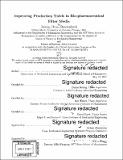| dc.contributor.advisor | Duane Boning and Roy Welsch. | en_US |
| dc.contributor.author | Rautenbach, Jeremy Brian | en_US |
| dc.contributor.other | Leaders for Global Operations Program. | en_US |
| dc.date.accessioned | 2017-10-18T15:10:47Z | |
| dc.date.available | 2017-10-18T15:10:47Z | |
| dc.date.copyright | 2017 | en_US |
| dc.date.issued | 2017 | en_US |
| dc.identifier.uri | http://hdl.handle.net/1721.1/111937 | |
| dc.description | Thesis: S.M., Massachusetts Institute of Technology, Department of Mechanical Engineering, in conjunction with the Leaders for Global Operations Program at MIT, 2017. | en_US |
| dc.description | Thesis: M.B.A., Massachusetts Institute of Technology, Sloan School of Management, in conjunction with the Leaders for Global Operations Program at MIT, 2017. | en_US |
| dc.description | Cataloged from PDF version of thesis. | en_US |
| dc.description | Includes bibliographical references (pages 89-91). | en_US |
| dc.description.abstract | This thesis presents methods to identify sources of variation in rolled goods manufacturing by defining the critical input process parameters, and the application of statistical process control. Sources of variation are prioritized according to a process control hierarchy, and reduced or eliminated through iterative cycles of rapid experimentation. This work emphasizes the value of team work, breaking down the organizational barriers between departments, knowledge sharing and the importance of a scientific approach to problem solving. FilterCo manufactures and assembles filter media catering to the ultrafiltration market growing at ~12% over the next five years. In a high growth scenario, production yield variability presents on-time delivery complications while below target yields drive significant scrap value. As FilterCo seeks to improve product lead time for its customers, while reducing WIP inventory, it must seek to maximize OEE with respect to product yield, equipment performance and availability. The variation identification, reduction and process control methodologies presented in this thesis are demonstrated to advance the goal of reducing production yield variation. The impact of the work has been verified on three filter media grades and have shown ~40% reduction in production yield variation, and rolled throughput yield improvements of ~30%. These improvements on the three membrane grades alone have resulted in an annualized saving equivalent to 60% of the total 2015 scrapped membrane value. | en_US |
| dc.description.statementofresponsibility | by Jeremy Brian Rautenbach. | en_US |
| dc.format.extent | 91 pages | en_US |
| dc.language.iso | eng | en_US |
| dc.publisher | Massachusetts Institute of Technology | en_US |
| dc.rights | MIT theses are protected by copyright. They may be viewed, downloaded, or printed from this source but further reproduction or distribution in any format is prohibited without written permission. | en_US |
| dc.rights.uri | http://dspace.mit.edu/handle/1721.1/7582 | en_US |
| dc.subject | Mechanical Engineering. | en_US |
| dc.subject | Sloan School of Management. | en_US |
| dc.subject | Leaders for Global Operations Program. | en_US |
| dc.title | Improving production yields in bio-pharmaceutical filter media | en_US |
| dc.type | Thesis | en_US |
| dc.description.degree | S.M. | en_US |
| dc.description.degree | M.B.A. | en_US |
| dc.contributor.department | Leaders for Global Operations Program at MIT | en_US |
| dc.contributor.department | Massachusetts Institute of Technology. Department of Mechanical Engineering | |
| dc.contributor.department | Sloan School of Management | |
| dc.identifier.oclc | 1005922290 | en_US |
